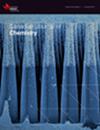用脉冲激光诱导脱湿制备金纳米颗粒催化剂制备硅纳米线
IF 1
4区 化学
Q3 CHEMISTRY, MULTIDISCIPLINARY
引用次数: 0
摘要
利用脉冲激光诱导脱湿(PLiD)作为一种新方法,利用化学气相沉积方法,用sicl4在H2存在下制备金纳米粒子(NP)催化阵列,以生长硅纳米线(NWs)。在抛光的Si衬底上,PLiD产生的Au NP催化剂具有长有序和窄尺寸分布。研究表明,Au NPs的单分散分布为生长的Si NWs提供了一致的直径控制。对NW硅合成时间、温度和气体流速的系统探索表明,在不同的实验参数下,NW硅在形态上具有一定程度的可调性,无论是阵列的还是纠缠的。对生长温度影响的研究还表明,当使用SiCl4作为前驱体时,Si NWs可以在低至700⁰C的温度下合成。由于同时存在三种Au NP尺寸分布,多孔Si衬底的使用可以直接观察到直径相关的生长。中小尺寸Au NP催化剂的生长首先发生,其次是大尺寸Au NP催化剂的生长,这只有在延长的时间或高SiCl4流动速率下才能观察到。大尺寸Au NPs的延迟生长是由于较大的催化剂NPs达到Si超饱和所需的时间较长。在这项工作中报道的生长的Si NWs的形态和直径控制使得这种方法在纳米电子学、传感器和LIB电极等应用中具有潜在的用途,这取决于所需的形态。本文章由计算机程序翻译,如有差异,请以英文原文为准。
Arrayed and Entangled Silicon Nanowires Using Au Nanoparticle Catalysts Prepared by Pulsed Laser-induced Dewetting
The use of pulsed laser-induced dewetting (PLiD) is reported as a novel approach in the fabrication of Au nanoparticle (NP) catalytic arrays for the growth of Si nanowires (NWs) by chemical vapor deposition using SiCl4in the presence of H2. On polished Si substrates, PLiD generates Au NP catalysts with long-range order and narrow size distributions. It has been shown that the monodispersed distribution of Au NPs provides consistent diameter control of the as-grown Si NWs. A systematic exploration of the Si NW synthesis time, temperature and gas flow rates illustrates a level of tunability in terms of morphology, be it arrayed or entangled Si NWs, with varying experimental parameters. An investigation of the effect of growth temperature also showed that Si NWs can be synthesized at temperatures as low as 700 ⁰C when using SiCl4 as the precursor. The use of porous Si substrates enabled direct observation of the diameter-dependent growth due to the simultaneous presence of three Au NP size distributions. Growth from the small- and medium-size Au NP catalysts occurred first, followed by that from the large-size Au NPs, which was only observed at extended times or high SiCl4 flow rates. The delayed onset of growth from the large-size Au NPs is due to the longer time to achieve Si super-saturation of larger catalyst NPs. The morphology and diameter control of the as-grown Si NWs reported in this work makes this approach potentially useful towards applications such as nanoelectronics, sensors, and LIB electrodes depending on the desired morphology.
求助全文
通过发布文献求助,成功后即可免费获取论文全文。
去求助
来源期刊

Canadian Journal of Chemistry
化学-化学综合
CiteScore
1.90
自引率
9.10%
发文量
99
审稿时长
1 months
期刊介绍:
Published since 1929, the Canadian Journal of Chemistry reports current research findings in all branches of chemistry. It includes the traditional areas of analytical, inorganic, organic, and physical-theoretical chemistry and newer interdisciplinary areas such as materials science, spectroscopy, chemical physics, and biological, medicinal and environmental chemistry. Articles describing original research are welcomed.
 求助内容:
求助内容: 应助结果提醒方式:
应助结果提醒方式:


